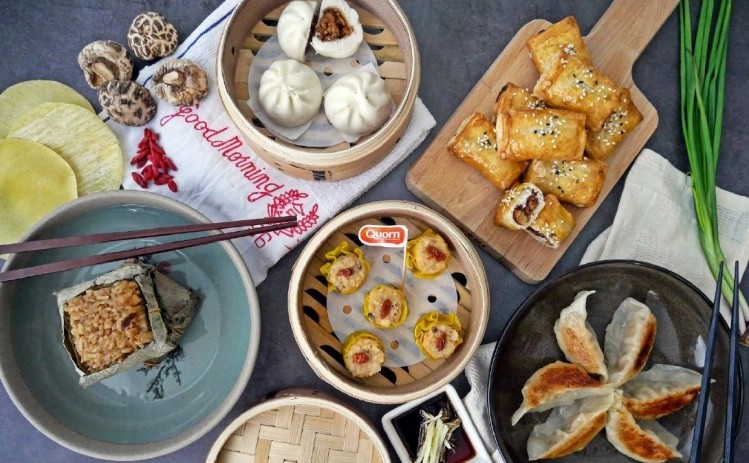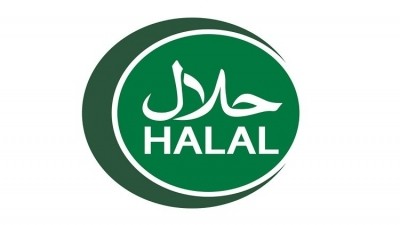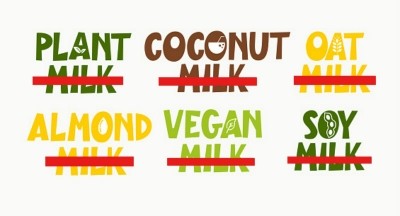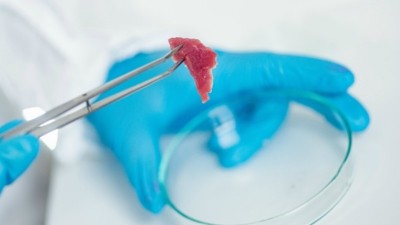Universal Asian cuisine: Quorn outlines retail distribution plans for meat-free dim sum series in Singapore

The products are now available on Singapore’s largest grocery e-commerce platform RedMart after launching as a home-delivery service in September.
Quorn revealed that demand has been strong and “exceeded our expectations” on its home delivery channel. The firm has been receiving about 20 orders daily on average, according to Christopher Lee, commercial director at Monde Nissin Singapore.
By the first half of 2021, Quorn hopes to retail in several boutique grocery e-commerce platforms. It is currently working on a new door-to-door channel as well as food service channels.
The dim sum range consist of five SKUs, they are the BBQ bun, glutinous rice, shaomai, Japanese gyoza and BBQ pastry puffs.
The products are made from Quorn’s mycoprotein ingredient, which is a protein produced by fermenting a fungus from the soil.
Universal Asian cuisine
Lee told FoodNavigator-Asia Monde Nissin mission was to incorporate Quorn into the Asian cuisine, so the firm chose dim sum.
“Dim sum is a versatile cuisine in Asia, people eat it for breakfast, lunch, dinner and even supper.
“It is a universal Asian cuisine that everybody likes, and is a gateway in Asia to enter a meat-free diet.”
Lee added: “We feel that the idea of a meat-free healthy concept works well in Singapore, and Singapore has quite an international market, and if we do well here, we can replicate the concept to other markets like Hong Kong.”
According to him, the most popular product in Singapore is the BBQ pastry.
Watch Lee share about Quorn’s dim sum series and challenges faced by the firm.
Testing ground
Lee said the decision to launch into home delivery service was a “strategic and testing ground” for the firm.
“We did not know whether the meat-free dim sum series would do well into the market. To go directly into the physical retail channel is risky in terms of investment, as well as freezer listing. It is a challenge to list the full range of products in the freezer section.
“So, going into home delivery channel allows us to test whether the concept works, and if consumers in Singapore like the idea and the product.”
Monde Nissin will be working with boutique e-commerce platforms to distribute Quorn’s dim sum series soon.
“During this pandemic situation, we have seen a lot of boutique e-commerce platforms coming up in Singapore offering healthy and sustainable foods,” he added,
“We also want to make sure that we have enough stock to move into bigger chains, because the last thing we want is disappointed customers.”
Lee added the firm was exploring a new door-to-door channel. “We are currently working with a company that has about 400 to 500 ‘Aunties’ who will knock on doors individually and direct sell the product.”
Another channel is the food service sector, although this had been badly affected by the pandemic.
He hopes to work with restaurants to customise Quorn’s versatile products into their menus.
Lee said: “We are definitely looking at moving from our home delivery channel, and opening up more channels for consumers to purchase the dim sum range.”
Challenges
R&D for the dim sum range took about one year.
Lee said taste was its biggest challenge addressed during product development.
“We try to mimic the taste of real dim sum meat. As a food business, we can’t be selling a healthy and sustainable food, but we compromise on the taste, consumers won’t buy that.”
The firm works with a manufacturing partner in Singapore to produce the products. One challenge in manufacturing was the minimum order quantity (MOQ).
Lee explained: “Most manufacturing facilities have a minimum production run, and the Singapore market is very small, so to have a batch sufficient to meet the minimum amount for the factory was a challenge we had to undertake.”
Lee said another issue the firm has to address before expanding into other Asian markets was the halal certification, as different markets in Asia recognised different bodies of halal. Quorn’s products are all halal certified.
Future of nutrition
For Quorn, it is not looking to replace meat, but rather provide another source of protein in the form of mycoprotein in the market.
Mycoprotein is high in protein and fibre, low in saturated fat, zero cholesterol and is soy-free. Studies have suggest that mycoprotein helps maintain normal blood cholesterol levels, and may have a positive effect on regulating blood glucose levels.
Lee said the firm has received interest from Brunei, Malaysia, Australia, New Zealand, and US for its dim sum range.
Monde Nissin and Quorn is currently working on bringing an Asian twist to a traditional Western food item - the sausage roll.
We discussed the future of Plant-based Innovation at length in our Growth Asia 2020 interactive broadcast series. Register and watch for free here.














